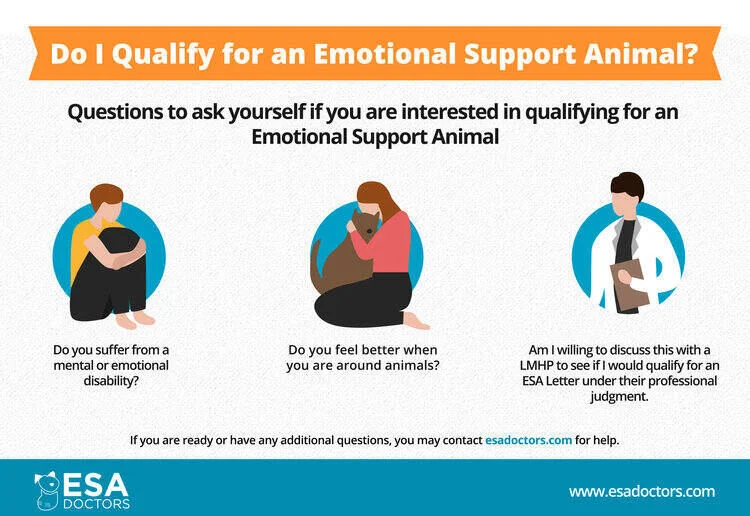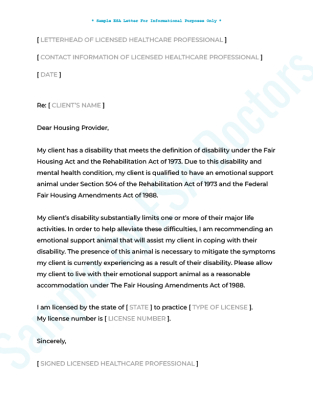How ESA Letters Work
What is an ESA letter?
Want to protect your pet as an emotional support animal? Get a legitimate and compliant ESA letter. An ESA letter gives you special benefits under federal and state housing laws.
With an ESA letter, your animal can be exempt from no-pet policies (including size and breed restrictions).
ESA owners also never have to pay a penny in pet fees or deposits.
And, of course, the most important benefit of all: emotional support animals are amazing for mental health and well-being.
Where is the best place to get an ESA letter online?
An ESA letter obtained through telehealth is just as good as one received through in-person visits.
If you want to obtain an ESA letter online, ESA Doctors can help. ESA Doctors can connect you to a friendly licensed professional specializing in ESA recommendations.
ESA Doctors is the premier online option – we have a 4.9 star rating on independent review platforms and are fully accredited by the BBB with one of the few A+ ratings in the entire industry.
What is the process for getting an ESA letter through ESA Doctors?
Qualifying for an ESA letter through ESA Doctors is convenient and easy. Here are the basic steps:
Complete the online questionnaire.
First, answer some questions in an online questionnaire regarding your situation.
Get matched with a licensed healthcare professional.
You will be matched with a compassionate professional who is licensed for your state.
Work directly with the healthcare professional.
The healthcare professional will evaluate whether you qualify for an ESA.
Receive your ESA letter.
If you meet their criteria, the healthcare professional will send you an ESA letter.
Use your ESA letter to protect your emotional support animal.
You can submit the ESA letter to your landlord to prove your animal is an ESA.
Who can write an ESA Letter?
An ESA letter must be written by a licensed healthcare professional that has evaluated your mental health. The following professionals can write ESA letters:
- Psychologists
- Psychiatrists
- Social Workers
- Doctors
- Nurse Practitioners
- Licensed Counselors
While many different types of healthcare professionals can write an ESA letter, it’s helpful to find someone that understands ESAs, like the ones that work with ESA Doctors.
What health conditions qualify for an ESA?
To qualify for an emotional support animal, you must have a mental or emotional health disability that substantially limits a major life activity like work, sleep, or socializing.
The most common conditions that ESA owners have are:
- Depression
- Anxiety
- PTSD
- Phobias
- Panic Disorders
- ADHD
- Autism
What are the benefits of having an ESA letter?
Based on Fair Housing ESA laws, an ESA letter gives you the following benefits:
- Accommodation in no-pet buildings.
- No pet fees or deposits.
- Exemption from size restrictions.
- Exemption from breed restrictions.
- Protection against housing discrimination.
What should an ESA letter contain?
Finding a healthcare professional via telehealth who understands ESA letters is important. An ESA letter, at a minimum, should be written on the healthcare professional’s letterhead and contain the following:
- The healthcare professional’s license number.
- The date the letter was issued.
- A statement that an ESA would alleviate symptoms of your mental health condition.
- The healthcare professional’s contact information.
- The healthcare professional’s signature.
If you prefer, an ESA letter does not have to contain specific details about your condition. You have a right to privacy regarding your mental health history.
When can an ESA be denied?
The right to have an emotional support animal is not absolute, even if you have an ESA letter. The following ESA behaviors can disqualify you from keeping an ESA in your home:
- Acting aggressively towards other people.
- Creating a safety or health concern.
- Causing substantial property damage.
- Not being up to date on vaccinations.
- Causing significant ongoing disturbances for other tenants.
A landlord cannot deny an ESA for reasons like a pet ban or prohibition against specific breeds or large dogs.
In addition, two types of landlords are exempt from ESA rules. These are:
- Owner-occupied buildings with no more than four units.
- Single-family homes sold or rented by the owner without the use of an agent.



